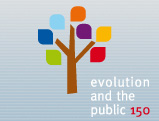
Evolution and the Public (1859-2009)
The discussion of a scientific
idea
and its ramifications since Charles Darwin
Call fpr papers:
When Charles Darwin published his theory of evolution by means of natural selection scientists and a wider public were well aware that this concept was more than a scientific explanation for natural phenomena. They already had a glimpse of what we today well know after a hundred-and-fifty years of debate: The theory of evolution impinges upon a great number of principle issues, be they theological, philosophical, moral, social or political, in short, on the basics of human existence and society. It holds the promise of a new freedom and new options while at the same time unveiling new dangers hidden below the surface of opportunities given to humanity to influence the evolutionary process.
At the beginning of the twenty-first century it is biotechnology and genetic engineering which drives controversial debates most strongly. The compatibility of religion and evolution, most pressing question when the debate was initiated, is still a matter on which feelings run high. When Darwin’s ideas were transplanted into other fields, people became sensitized to new possibilities and new risks: for the individual, for groups defined in social or national terms, for society in general. Social Darwinism, eugenics and the power to affect creation in particular fired and, in modernized form, still fire the imagination.
The conference will look at this multifaceted public debate as it was conducted in the Western world (a focus will be on Europe and North America), on various levels from academic circles to casual conversations of ‘ordinary people’, in various media of popular or high culture stance (literature in the broadest sense, the press, radio, television, film, internet, museums etc.). In analyzing the debate on evolution in the public it inquires after an evolution of the public, a transformation it may have undergone in the process. Themes of possible contributions should touch on the following categories of topics, which will structure the conference as well as the different forms in which its results will be published.
- The emergence of a public debate
- Evolution and religion – a controversy without end?
- The public and the scientist: Images of scientists from Darwin to the present
- From Darwinism to Social Darwinism
- Eugenics in Europe and North America: Defining an ideal and the attempts at implementing it
- The debate on evolution in the age of the human genome: biotechnology, genetics and man as lord of creation
- Evolution of the public and the future of the debate.
Proposals for papers are invited from those working in history, history of science and technology, natural sciences, social sciences, philosophy, theology, art history, literary criticism, media studies or related disciplines. Conference language will be English.



